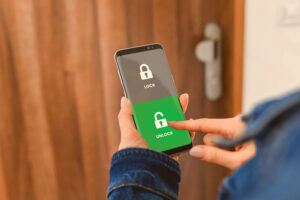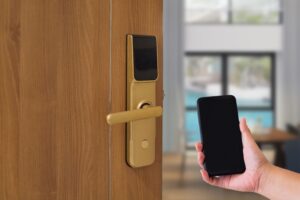Enhancing the Guest Experience and Security with Smart Door Locks
As the world of Hospitality continues to evolve, hotels are continually seeking innovative ways to improve their guest experience while keeping their properties secure. One of the latest technological advancements in the Hospitality Industry is the use of smart door locks. Smart door locks offer numerous advantages for hotels, including enhanced security, convenience, and efficiency. Hotel management can customize access codes, manage room access remotely, and provide guests with a hassle-free check-in and check-out process. By implementing smart door locks, hotels can significantly enhance the guest experience while keeping their properties secure.
Types of Door Lock Technology for Hotels
When it comes to smart door lock technology for hotels, there are several options to choose from. There are several types of smart door lock technology available for hotels, each with its unique features and benefits that can enhance the guest experience while improving the overall security of the property. From RFID and Bluetooth technology to biometric and keypad technology, hotels can choose the technology that best suits their needs and enhances the guest experience. By implementing smart door lock technology, hotels can improve security, increase efficiency, and provide a more streamlined check-in and check-out process for their guests.
RFID Technology
RFID (Radio Frequency Identification) technology is one of the most commonly used smart lock technologies in the Hospitality Industry. This technology uses radio waves to communicate between a key card or fob and the lock. Guests simply hold their key card or fob up to the lock to gain access to their room. RFID technology is easy to use, and it provides an added layer of security since the key cards or fobs are unique to each guest.
Bluetooth Technology
Bluetooth technology is another popular smart lock technology used in hotels. This technology allows guests to use their smartphones as a key to access their rooms. Guests simply download the hotel’s app and use it to unlock their door. Bluetooth technology is convenient since guests are less likely to lose their phones than traditional key cards.
Biometric Technology
Biometric technology is a more advanced form of smart lock technology that uses a person’s unique physical characteristics, such as their fingerprint or facial recognition, to grant access. This technology is particularly useful for high-security areas or executive suites, where only authorized personnel should have access. Biometric technology provides an added layer of security since it is nearly impossible to duplicate a person’s unique physical characteristics.
Keypad Technology
Keypad technology is another type of smart lock technology that is commonly used in hotels. Guests enter a unique code into a keypad to gain access to their room. This technology is particularly useful for guests who prefer not to carry around a physical key or who may be prone to losing their key cards or fobs. Keypad technology is easy to use, and it provides an added layer of security since the codes are unique to each guest.
Magnetic Stripe Technology
Magnetic stripe technology is an older form of smart lock technology that is still used in some hotels. This technology uses a magnetic stripe on a key card to communicate with the lock. Guests simply swipe their key card to gain access to their room. While magnetic stripe technology is not as advanced as some of the other options, it is still an effective way to secure guest rooms.
How can Hotels Benefit from Smart Door Lock Technology?
As hotels continue to adapt to the changing needs and expectations of their guests, the use of smart door locks is becoming increasingly popular. These locks offer a range of benefits that traditional locks cannot match, including enhanced security, customizable access, and remote management.
Enhanced Security
Security is a top priority for hotels, and smart door locks provide an extra layer of protection for both guests and staff. Unlike traditional locks, smart door locks do not require a physical key. Instead, guests are given a unique code to enter into the lock, which eliminates the risk of lost or stolen keys. Additionally, these locks are designed with advanced encryption technology, making them nearly impossible to hack or manipulate. This added security not only protects guests’ belongings but also gives them peace of mind while staying at the hotel.
Convenience and Efficiency
Smart door locks are incredibly convenient for both guests and staff. Guests can access their rooms with ease, without the hassle of fumbling with keys or waiting in line at the front desk. Furthermore, staff members can easily manage room access for guests, housekeeping, and maintenance without the need for physical keys or access cards. This results in more efficient operations and a smoother check-in and check-out process for guests.
Customizable Access
One of the most significant advantages of using smart door locks in hotels is the ability to customize access for different guests and staff members. Hotel management can assign specific access codes to guests based on their room type or duration of stay. For example, guests staying in a suite may have access to certain areas of the hotel that other guests do not. Additionally, staff members can be given unique access codes that only work during their shift, ensuring that only authorized personnel have access to restricted areas.
Remote Management
Smart door locks can be managed remotely, providing hotel management with greater control and oversight. For example, if a guest loses their code or forgets it in their room, staff members can remotely reset the code without having to physically visit the room. Additionally, hotel management can monitor access logs to ensure that only authorized personnel are entering restricted areas.
Enhanced Guest Experience
Overall, the use of smart door locks in hotels can significantly enhance the guest experience. Guests can enjoy a hassle-free check-in and check-out process, as well as the added convenience of not having to carry around a physical key. Furthermore, the added security and customizable access codes give guests peace of mind while staying at the hotel. These features, along with the ability to manage room access remotely, result in a more efficient and streamlined hotel operation.


